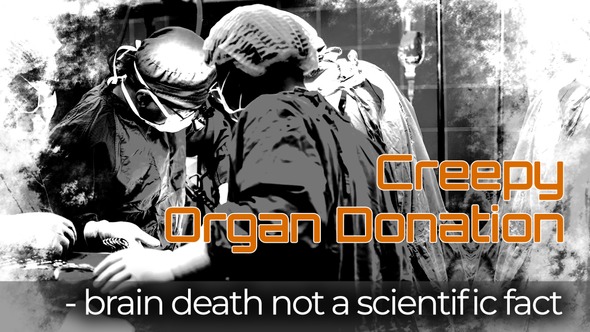Health & Medecine (English)
Creepy Organ Donation – Brain Death Not a Scientific Fact
05.05.2020
Subtitle "Afrikaans" was produced by machine.Subtitle "አማርኛ" was produced by machine.Subtitle "العربية " was produced by machine.Subtitle "Ārāmāyâ" was produced by machine.Subtitle "azərbaycan dili " was produced by machine.Subtitle "беларуская мова " was produced by machine.Подзаглавието "България" е създадено от машина.সাবটাইটেল "বাংলা " মেশিন দ্বারা তৈরি করা হয়েছিল।Subtitle "བོད་ཡིག" was produced by machine.Subtitle "босански" was produced by machine.Subtitle "català" was produced by machine.Subtitle "Cebuano" was produced by machine.Subtitle "ગુજરાતી" was produced by machine.Subtitle "corsu" was produced by machine.Podtitul "Čeština" byl vytvořen automaticky.Subtitle "Cymraeg" was produced by machine.Subtitle "Dansk" was produced by machine.Untertitel "Deutsch" wurde maschinell erzeugt.Subtitle "Untertitel" was produced by machine.Ο υπότιτλος "Ελληνικά" δημιουργήθηκε αυτόματα.Subtitle "English" was produced by machine.Subtitle "Esperanto" was produced by machine.El subtítulo "Español" se generó automáticamente.Subtitle "Eesti" was produced by machine.Subtitle "euskara" was produced by machine.Subtitle "فارسی" was produced by machine.Subtitle "Suomi" was produced by machine.Le sous-titrage "Français" a été généré automatiquement.Subtitle "Frysk" was produced by machine.Subtitle "Gaeilge" was produced by machine.Subtitle "Gàidhlig" was produced by machine.Subtitle "Galego" was produced by machine.Subtitle "Schwizerdütsch" was produced by machine.Subtitle "هَوُسَ" was produced by machine.Subtitle "Ōlelo Hawaiʻi" was produced by machine.Subtitle "עברית" was produced by machine.Subtitle "हिन्दी" was produced by machine.Subtitle "Mẹo" was produced by machine.Podnaslov "Hrvatski" generiran je automatski.Subtitle "Kreyòl ayisyen " was produced by machine.Subtitle "Magyar" was produced by machine.Subtitle "Հայերեն" was produced by machine.Subtitle "Bahasa Indonesia " was produced by machine.Subtitle "Asụsụ Igbo " was produced by machine.Textun"Íslenska" var framkvæmt vélrænt.Sottotitoli "Italiano" sono stati generati con l'intelligenza artificiale.字幕は"日本語" 自動的に生成されました。Subtitle "Basa Jawa" was produced by machine.Subtitle "ქართული" was produced by machine.Subtitle "қазақ тілі " was produced by machine.Subtitle "ភាសាខ្មែរ" was produced by machine.Subtitle "ಕನ್ನಡ" was produced by machine.Subtitle "한국어" was produced by machine.Subtitle "कोंकणी語" was produced by machine.Subtitle "کوردی" was produced by machine.Subtitle "Кыргызча" was produced by machine.Subtitle " lingua latina" was produced by machine.Subtitle "Lëtzebuergesch" was produced by machine.Subtitle "Lingala" was produced by machine.Subtitle "ພາສາ" was produced by machine.Antraštė "Lietuvių" buvo sukurta mašina.Subtitle "Latviešu" was produced by machine.Subtitle "fiteny malagasy" was produced by machine.Subtitle "te reo Māori" was produced by machine.Subtitle "македонски јазик" was produced by machine.Subtitle "malayāḷaṁ" was produced by machine.Subtitle "Монгол хэл" was produced by machine.Subtitle "मराठी" was produced by machine.Subtitle "Bahasa Malaysia" was produced by machine.Subtitle "Malti" was produced by machine.Subtitle "မြန်မာစာ " was produced by machine.Subtitle "नेपाली" was produced by machine.Ondertitels "Nederlands" machinaal geproduceerd.Subtitle "Norsk" was produced by machine.Subtitle "chiCheŵa" was produced by machine.Subtitle "ਪੰਜਾਬੀ" was produced by machine.Podtytuł "Polska" został utworzony przez maszynę.Subtitle "پښتو" was produced by machine.Legenda "Português" foi gerada automaticamente.Subtitle "Română" was produced by machine.Subtitle "Язык жестов (Русский)" was produced by machine.Субтитры "Pусский" были созданы машиной.Subtitle "Kinyarwanda" was produced by machine.Subtitle "सिन्धी" was produced by machine.Subtitle "Deutschschweizer Gebärdensprache" was produced by machine.Subtitle "සිංහල" was produced by machine.Subtitle "Slovensky" was produced by machine.Subtitle "Slovenski" was produced by machine.Subtitle "gagana fa'a Samoa" was produced by machine.Subtitle "chiShona" was produced by machine.Subtitle "Soomaaliga" was produced by machine.Titra "Shqip" u krijua automatikisht.Превод "србски" је урађен машински.Subtitle "Sesotho" was produced by machine.Subtitle "Basa Sunda" was produced by machine.Undertext "Svenska" är maskinell skapad.Subtitle "Kiswahili" was produced by machine.Subtitle "தமிழ்" was produced by machine.Subtitle "తెలుగు" was produced by machine.Subtitle "Тоҷикй" was produced by machine.Subtitle "ภาษาไทย" was produced by machine.ንኡስ ኣርእስቲ "ትግርኛ" ብማሽን እዩ ተፈሪዩ።Subtitle "Türkmençe" was produced by machine.Subtitle "Tagalog" ay nabuo sa pamamagitan ng makina.Altyazı "Türkçe" otomatik olarak oluşturuldu.Subtitle "татар теле" was produced by machine.Subtitle "Українська " was produced by machine.ذیلی عنوان "اردو" مشین کے ذریعہ تیار کیا گیا تھا۔Subtitle "Oʻzbek" was produced by machine.Phụ đề được tạo bởi máy.Subtitle "Serbšćina" was produced by machine.Subtitle "isiXhosa" was produced by machine.Subtitle "ייִדיש" was produced by machine.Subtitle "Yorùbá" was produced by machine.Subtitle "中文" was produced by machine.Subtitle "isiZulu" was produced by machine.
kla.TV accepts no liability for defective translation.kla.TV accepts no liability for defective translation.kla.TV accepts no liability for defective translation.kla.TV accepts no liability for defective translation.kla.TV accepts no liability for defective translation.kla.TV accepts no liability for defective translation.kla.TV не носи отговорност за некачествен превод.অপর্যাপ্ত অনুবাদের জন্য kla.TV কোন দায় বহন করে না।kla.TV accepts no liability for defective translation.kla.TV accepts no liability for defective translation.kla.TV accepts no liability for defective translation.kla.TV accepts no liability for defective translation.kla.TV accepts no liability for defective translation.kla.TV accepts no liability for defective translation.kla.TV nenese žádnou odpovědnost za chybné překlady.kla.TV accepts no liability for defective translation.kla.TV accepts no liability for defective translation.kla.TV übernimmt keine Haftung für mangelhafte Übersetzung.kla.TV accepts no liability for inadequate translationΗ kla.TV δεν φέρει καμία ευθύνη για ανεπαρκή μετάφραση.kla.TV accepts no liability for defective translation.kla.TV accepts no liability for defective translation.kla.TV no se hace responsable de traducciones incorrectas.kla.TV accepts no liability for defective translation.kla.TV accepts no liability for defective translation.kla.TV accepts no liability for defective translation.kla.TV accepts no liability for defective translation.kla.TV n'assume aucune responsabilité en cas de mauvaise traduction.kla.TV accepts no liability for defective translation.kla.TV accepts no liability for defective translation.kla.TV accepts no liability for defective translation.kla.TV accepts no liability for defective translation.kla.TV accepts no liability for defective translation.kla.TV accepts no liability for defective translation.kla.TV accepts no liability for defective translation.kla.TV accepts no liability for defective translation.kla.TV accepts no liability for defective translation.kla.TV accepts no liability for defective translation.kla.TV ne preuzima nikakvu odgovornost za neadekvatne prijevode.kla.TV accepts no liability for defective translation.kla.TV nem vállal felelősséget a hibás fordításértkla.TV accepts no liability for defective translation.kla.TV accepts no liability for defective translation.kla.TV accepts no liability for defective translation.kla.TV tekur enga ábyrgð á áræðanleika þýðingarinnarKla.TV non si assume alcuna responsabilità per traduzioni lacunose e/o errate.Kla.TV は、不適切な翻訳に対して一切の責任を負いません。kla.TV accepts no liability for defective translation.kla.TV accepts no liability for defective translation.kla.TV accepts no liability for defective translation.kla.TV accepts no liability for defective translation.kla.TV accepts no liability for defective translation.kla.TV accepts no liability for defective translation.kla.TV accepts no liability for defective translation.kla.TV accepts no liability for defective translation.kla.TV accepts no liability for defective translation.kla.TV accepts no liability for defective translation.kla.TV accepts no liability for defective translation.kla.TV accepts no liability for defective translation.kla.TV accepts no liability for defective translation.kla.TV neprisiima jokios atsakomybės už netinkamą vertimą.kla.TV accepts no liability for defective translation.kla.TV accepts no liability for defective translation.kla.TV accepts no liability for defective translation.kla.TV accepts no liability for defective translation.kla.TV accepts no liability for defective translation.kla.TV accepts no liability for defective translation.kla.TV accepts no liability for defective translation.kla.TV accepts no liability for defective translation.kla.TV accepts no liability for defective translation.kla.TV accepts no liability for defective translation.kla.TV accepts no liability for defective translation.kla.TV aanvaardt geen aansprakelijkheid voor foutieve vertalingen.kla.TV accepts no liability for defective translation.kla.TV accepts no liability for defective translation.kla.TV accepts no liability for defective translation.kla.TV nie ponosi odpowiedzialności za wadliwe tłumaczenie.kla.TV accepts no liability for defective translation.kla.TV não se responsabiliza por traduções defeituosas.kla.TV accepts no liability for defective translation.kla.TV accepts no liability for defective translation.kla.TV не несет ответственности за некачественный перевод.kla.TV accepts no liability for defective translation.kla.TV accepts no liability for defective translation.kla.TV accepts no liability for defective translation.kla.TV accepts no liability for defective translation.kla.TV accepts no liability for defective translation.kla.TV accepts no liability for defective translation.kla.TV accepts no liability for defective translation.kla.TV accepts no liability for defective translation.kla.TV accepts no liability for defective translation.kla.TV nuk mban asnjë përgjegjësi për përkthime joadekuate.kla.TV не преузима никакву одговорност за неадекватне преводе..kla.TV accepts no liability for defective translation.kla.TV accepts no liability for defective translation.Kla.TV tar inget ansvar för felaktiga översättningar.kla.TV accepts no liability for defective translation.kla.TV accepts no liability for defective translation.kla.TV accepts no liability for defective translation.kla.TV accepts no liability for defective translation.kla.TV accepts no liability for defective translation.kla.TV ንዝኾነ ጉድለት ትርጉም ዝኾነ ይኹን ሓላፍነት ኣይቅበልን እዩ።kla.TV accepts no liability for defective translation.kla. Walang pananagutan ang TV sa mga depektibong pagsasalin.kla.TV hatalı çeviriler için hiçbir sorumluluk kabul etmez.kla.TV accepts no liability for defective translation.kla.TV accepts no liability for defective translation.kla.TV عیب دار ترجمہ کے لیے کوئی ذمہ داری قبول نہیں کرتا ہے۔kla.TV accepts no liability for defective translation.Kla. TV không chịu trách nhiệm về bản dịch không đầy đủ.kla.TV accepts no liability for defective translation.kla.TV accepts no liability for defective translation.kla.TV accepts no liability for defective translation.kla.TV accepts no liability for defective translation.kla.TV accepts no liability for defective translation.kla.TV accepts no liability for defective translation.
Creepy Organ Donation – Brain Death Not a Scientific Fact
05.05.2020
www.kla.tv/16312
Living organs must be taken from living "dead" to perform an organ transplantation. To make this possible, the so-called brain death has been redefined. But see here what brain-dead people are still capable of and who benefits from these organ transplants.
[continue reading]
Creepy Organ Donation – Brain Death Not a Scientific Fact
Download broadcast and attachments in the wanted quality:
Hashtags:
Useage rights:
Standard-Kla.TV-Licence

 Deutsch-ID setzten
Deutsch-ID setzten



Sendungstext
herunterladen
05.05.2020 | www.kla.tv/16312
For an organ donation what happens is that the living, beating heart and living organs are taken from a living “dead” person. This procedure is even performed under anesthesia because the “dead” react to the pain of the operation similarly to “living” people. The pulse speeds up, blood pressure changes, hormones are released, and involuntary movement happens. Spooky for doctors. That is why the hypothetical “corpse” is partially anaesthetized, in Switzerland this is even mandatory. Brain dead women can give birth to children. Brain dead men can have erections. Brain dead persons can show reactions to outer stimuli, movements of arms and legs are possible. "Brain death is not a scientific fact. It is not a medical diagnosis." Dr. Robert Truog, American pediatrician "Brain death doesn't exist at all; it's a fiction of transplant medicine." Prof. Dr. Franko Rest, German researcher on death and ethics. In 1996, Dr. Zieger reported to the Health Committee of the German Parliament that coma patients clearly react to external events and social stimuli, such as visits from relatives. The brain dead are warm, the metabolism works. Brain dead patients combat infections and injuries, e.g. through fever. They produce and excrete excrement. The brain dead have to be fed, cared for, monitored, tested and supplied with medication so that they do not die. Brain dead are resuscitated if necessary. Isn't that a contradiction of terms: resuscitate the dead? The brain death criteria was introduced in 1968, expressly for the purpose of organ procurement. The nursing staff is instructed to give restless "dead" patients muscle-relaxing injections so that they do not move when relatives come to bid farewell. “The removal of organs from a human being while still alive is a legally punishable homicide. In order to obtain organs that can be preserved without making oneself liable to prosecution, brain death has been declared a human death." Prof. Klaus Peter Jörns, emeritus head of the Institute for Religion, Sociology of the Faculty of Theology of the Humboldt University of Berlin”. “Organ removal is murder”, Dr. David Evans, British cardiologist and lecturer "When the body is cut open while the heart is beating, from the neck to the pubic symphysis, blood pressure, heart rate and adrenaline rise. Also redness of the face, extensive skin redness and sweating can occur. In normal operations these signs are considered pain reactions, but not with patients declared brain dead." "Brain death is an error and not the death of a human being. This might sound embarrassing, but it can be explained on any level of logic." Prof. Dr. med. Dörner. "As a unique and unmistakable creature, man is represented not only by his brain but also by his body. But 97% of this body is still alive at brain death." Prof. Dr. Linus Geisler, cardiologist Medications suppressing the rejection of new organs cost several thousand Euros per year and patient. After a transplantation, lifelong (!) medical monitoring, frequent stays in hospitals and medication with many side effects (so-called immunosuppressants) become necessary. The medication, which can cost several thousand Euros a month, switch off the immune system so that the body doesn’t reject the foreign organ. From this alone one can conclude that organ transplantation is contradictory to human nature: the body often defends itself in such a way against the serious intervention, that the rejection of the foreign organ is more important to it than the preservation of the life of its own body. Taking immunosuppressive drugs drastically increases the general risk of infection. The person becomes susceptible to the smallest of infections; fungi, bacteria and blood clotting is reduced. The cortisone in the medication causes the body to swell. There is a large number of unreported cases of organ recipients who have an inexplicable longing for death. The market for so-called immunosuppressants, which suppress the repulsion of the foreign organ in the receiver, is said to amount annually to 1.6 billion Euros alone. The case based rates for transplantations were between 18,000 and 215,000 Euros in 2011, depending on the organ and effort. A liver, for example, costs 98,000 to 130,000 dollars; a heart between 130,000 to 160,000 dollars. "The transplant and pharmaceutical market is worth billions of dollars." Richard Fuchs, non-fiction author 60% of the supposedly brain dead patients could regain consciousness. • McKinley was declared brain dead and his parents decided to donate his organs. But suddenly, the 13-year-old boy moved his hand and then his feet. The brain-dead boy awakened from his coma. • Angele Lieby, who was declared brain dead, also woke up from her coma and became healthy again. She too felt the nurses’ touches, as they stuck a needle into her and inserted a cannula into her neck. She heard the others talking about her, the doctors who seemed convinced that she was brain dead and suggested to her husband to prepare for her funeral. But she was still there! • Colleen Burns even woke up during her own organ removal. Doctors mistakenly pronounced her dead with "irreversible brain damage". • 56-year-old Gloria Cruz also fully recovered from her "brain death". Her husband delayed switching off the devices. • Rosemarie Körner's ex-husband woke up from his brain death. He insulted the doctors, calling them all fools because they had put him in a refrigerator in the basement. He was then pulled out again by totally hectic doctors and a doctor cut his neck. Without anesthesia or painkillers, they operated on him again. The head doctor of the ward confirmed that this had happened. How can a dead person see what is happening to him? Why can a dead person feel pain? • The doctor assured Karina's relatives that there was no hope for this girl and almost in the same breath, she asked if the family would be willing to donate Karina's organs. But then Karina suddenly started breathing by herself again. Awakening from the coma, she signals her father, "I am alive". • The parents of Violetta from Poland did not accept the diagnosis of brain death and did not give permission to remove her organs. Violetta woke up, recovered and is now married.
from ls.
Quellen der vom Hirntod Aufgewachten bild.de, Organe waren schon zur Spende freigegeben, Hirntoter Junge (13) erwacht aus dem Koma, 07.05.2018 Badische-Zeitung.de, Für hirntot erklärt und wieder aufgewacht: Die Straßburgerin Angèle Lieby, 04.01.2014 abc-news.go.com, Patient wakes up as doctors get ready to remove organs, 09.07.2013 foxnews.com, Husband celebrates miracle as braindead wife wakes up in hospital, 11.05.2011 Organspende - Die verschwiegene Seite, KAO-Infoblatt, S.34-36 «Ihr Mann wachte 1975 aus Hirntod wieder auf – Heutzutage wären seine Überlebenschanchen geringer» «Tabuthema Hirntod - Zweifel an der Qualität der Diagnostik» youtube.com, REPORT MÜNCHEN, 21.11.2012 (ARD) «Wioletta, eine Hirntodfehldiagnose?» youtube.com, 16.01,2011